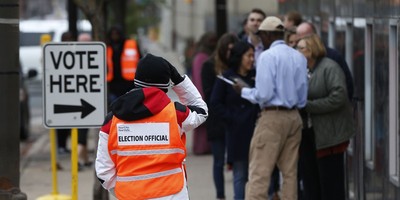Under the auspices of immigration reform, a prominent bipartisan group of lawmakers has embarked on a months-long journey. At the outset, some were hopeful that closed-door negotiations would result in concrete steps to fix our nation’s broken immigration system.
In a recent interview, Sen. Marco Rubio (R-FL) seemed to acknowledge he thought real reform was possible. In an interview with Sean Hannity, Rubio said, “When I initially got involved in this effort in December of last year, I initially said let’s make sure everything, including that first step [of legalization], is conditioned on the border and all these other things.”
After identifying a “problem” with that approach, Rubio opted for the legalization-first approach favored by the likes of Sens. Chuck Schumer (D-NY) and John McCain (R-AZ). Many of his colleagues did not get the message, though. Last week, 43 Senators voted in favor of an enforcement-first approach.
The amendment, offered by Sen. Chuck Grassley (R-IA), would have required that the border be secured before illegal immigrants were allowed to apply for legal status, known as registered provisional immigrant (RPI) status. If all 43 Senators remain committed to an enforcement-first approach, the Gang of Eight bill is effectively dead because Senate Majority Leader Harry Reid (D-NV) would not have the 60 votes necessary to cut off debate.
Unfortunately, intellectual consistency is a rarity in Washington.
Of the 43 Senators voting in favor of an enforcement-first approach, one -- Sen. Kelly Ayotte (R-NH) -- has already announced her support for the Gang of Eight’s legalization-first approach. Another, Sen. John Cornyn (R-TX) has proposed a border security and enforcement amendment that could attract significant support from some of his Republican colleagues, including Sen. Mitch McConnell (R-KY).
Recommended
Interestingly enough, Cornyn’s criticism of the Gang of Eight’s bill (Dallas Morning News, 6/5) is fitting of his amendment:
“For starters, its border-security triggers are talking points disguised as policy: Legalization of the estimated 11 million illegal immigrants in the United States would be activated by meaningless promises rather than concrete results. Haven’t we heard enough of that from Washington?”
Cornyn demonstrated a Rubio-esque logic shift when he penned a new op-ed (USA Today, 6/9) just a few days later. Rather than focusing on the “legalization of the estimated 11 million illegal immigrants”, Cornyn focused on how the “bill grants permanent legal status to millions of undocumented immigrants without any guarantee of a secure border.”
Enforcement first became legalization first or, as Rubio explained in his now infamous Univision interview: “First comes the legalization. Then come the measures to secure the border. And then comes the process of permanent residence.”
Despite their desire (whether based on principle or politics) for an enforcement-first approach, Republicans appear willing to embrace Rubio’s framework.
But they’d be advised to look before they leap. One of Rubio’s negotiating partners, Sen. Dick Durbin (D-IL), sees the Gang of Eight’s bill a bit differently. Durbin said:
“We have de-linked the pathway to citizenship and border enforcement. You could be on a path to a million people reaching citizenship and have one bad week on the border, at which point you stop, and that’s just unacceptable.”
Even though Jeb Bush no longer believes it, his line “that those who violated the laws can remain but cannot obtain the cherished fruits of citizenship” comes to mind. Clearly Durbin’s intent is different: absolutely nothing will stand in the way of 11+ million illegal immigrants being granted amnesty and receiving citizenship.
That should raise alarm bells for self-proclaimed conservatives flirting with the bill by drafting and offering tough sounding amendments. As one unnamed Senate aide said, many of these amendments are simply about “dialing down conservative blowback” back home.
For us conservatives, it is time to dial up the pressure.
























Join the conversation as a VIP Member